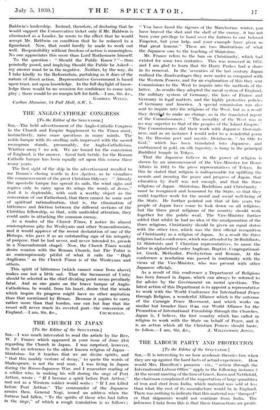THE CHURCH IN JAPAN
[To the Editor of the SPECTATOR.] SIR,— I was much interested to read the article by the Rev. W. F. France which appeared in your issue of June 21st regarding the Church in Japan. I was surprised, however, to find no reference to the oldest known religion of Japan- Shintoism—for it teaches that we are divine spirits, and "that this muddy vesture of decay," to quote the words of Shakespeare, is not the real man. I was living in Japan during the Russo-Japanese War, and I remember reading of a soldier who, in making his will during the siege of Port Arthur, wrote : " If I become a spirit before Port Arthur," and not as a Western soldier would write : " If I am killed before Port Arthur." The commander of the Japanese armies then, General Nogi, issued an address when the fortress had fallen, " To the spirits of those who had fallen in the siege," of which a rough translation is as follows :
" You have faced the rigours of the Manchurian winter, you have braved the shot and the shell of the enemy, it has not been your privilege to hand over the fortress to our beloved Emperor, but your help, and your example have given us that great honour." These are two illustrations of what the Japanese owe to the teaching of Shintoism.
Mr. France refers to the ban on Christianity, which had existed for some two centuries. This was removed in 1872. and I am glad to learn that Sir Harry Parkes had a share in its removal. In the 'seventies of the last century Japan realized the disadvantages they were under as compared with the Western Powers, and for an explanation of this they sent Commissions to the West to inquire into the methods of the latter. As results they adopted the naval system of England, the military system of Germany, the laws of Franee and Germany in legal matters, and the highly protective policies of Germany and America. A special commission was also sent to inquire into the religions of the West. but as a result they decidad to make no change, as in the translated report of the Commissioners : " The morality of the West was in no way superior to that of the peoples of the Island Empire." The Commissioners did their work with Japanese thorough- ness, and as an instance I would refer to a wonderful poem by the Russian poet and mystic. Derzhavin, " An Ode to God,'' which has been translated into .Japanese, and emblazoned in gold, on silk tapestry, is hung in the principal Buddhist temple in Tokyo.
That the Japanese believe in the power of religion is shown by an announcement of the Vice-Minister for Home Affairs in 1912 to the press representatives of Tokyo. In this he stated that religion is indispensable for uplifting the morals and insuring the peace and progress of Japan, that education by itself was not enough, and that the three religions of Japan --Shintoism, Buddhism and Christianity -- must be recognized and honoured by the State, so that they could together work for the moral and social well-being of the State. Ile further pointed out that of late years the people of Japan have come to look down on all religions, but the three great religions of the country should work together for the public weal. The Vice-Minister further added that whilst he had no idea of the amalgamation of the three religions, Christianity should be given an equal status with the other two, which was the first ollicial recognition of Christianity as a religion of .Japan. As a result the three religions had a conference, which was attended by 50 Buddhists, 15 Shintoists and 7 Christian representatives, to name the latter in alphabetical order Anglican, Baptist, Congregational- ist, Greek, Methodist, Presbyterian and Roman. At the conference a resolution was passed in conformity with the views of the Vice-Minister, who was present with other Japanese officials.
As a result of this conference a Department of Religions has been formed in Japan, which can always be referred to for advice by the Government on moral questions. The latest action of this Department is to appoint a representative to work with the World Conference for International Peace through Religion, a wonderful Alliance which is the outcome of the Carnegie Peace Movement, and which works on similar but broader lines tl an our World Alliance for the Promotion of International Friendship through the Churches. Japan is, I believe, the first country which has called in religion to work with the State on behalf of Peace, and it is an action which all the Christian Powers should haste.










































 Previous page
Previous page